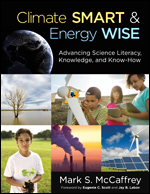 It's down to the wire as I complete the proofs of my upcoming book, Climate Smart & Energy Wise, which Corwin Press will release around the autumnal equinox, September 23—one of two times in the year when day and night are roughly balanced at 50/50—and which also happens to be during Climate Week NYC and the UN Climate Summit.
It's down to the wire as I complete the proofs of my upcoming book, Climate Smart & Energy Wise, which Corwin Press will release around the autumnal equinox, September 23—one of two times in the year when day and night are roughly balanced at 50/50—and which also happens to be during Climate Week NYC and the UN Climate Summit.
Auspicious timing? Time, as they say, will tell.
In the weeks leading up to the release of the book, I plan to summarize the chapters of Climate Smart & Energy Wise and share them on NCSE's blog. The summarized chapters:
- "Climate and Energy 101"
- "Teaching (And Learning) About Climate Challenges and Energy Solutions"
- "Syncing with the Standards," specifically the Next Generation Science Standards and related mathematics and language arts standards,
- "Teaching Climate Literacy"
- "Teaching Energy Literacy," (unpacking the Climate and Energy Literacy frameworks),
- "Programs that Work"
- "Countering Skepticism, Doubt and Despair"
- and a concluding chapter on "Knowledge, Know-how and Informed Action"
The book also includes three appendices, the first including statements from organizations that explicitly support climate education. The second and third are excerpts from Climate Literacy and Energy Literacy, which identify essential principles and fundamental concepts of climate and energy.
I'm honored to have the preface written by Jay Labov of the National Academy of Sciences and Eugenie Scott, formerly the executive director of the National Center for Science Education and now the chair of NCSE’s advisory council.
In their preface, Labov and Scott lay out the essential conundrum we face in climate education:
During the next couple of decades, as climate change and energy needs become increasingly critical important social and political issues; individual citizens, industries that emit large amounts of carbon into the atmosphere, and governments will need to make important economic, political, social, and ethical decisions. These decisions must be informed by and grounded in accurate and up-to-date science.
Yet the young people who are most likely to be responsible for these decisions in the near future exhibit little understanding of climate science. One reason for this lack of knowledge is that climate science is rarely taught comprehensively in our schools. In some cases, it may not be discussed at all because teachers feel pressure from school officials, boards of education, and citizens groups to avoid addressing this and other “controversial” topics.
For more than two decades, efforts to improve our collective understanding and response to the climate crisis have been stifled and scuttled by vested interests. These well-funded forces cast baseless doubt on well-established science, invent and foment artificial controversy, and resort to pseudoscience to make their case. They also politicize science education by claiming that teaching climate change is inherently political rather than educational.
The scientific evidence for climate change is strong, and there is general acceptance of the science by most Americans. However, in large part because the science has often been not taught or skimed over, understanding often tends to be shallow and the attention of citizens is easily distracted.
Fortunately, there is a convergence of positive factors, such as new education standards, the Next Generation Science Standards, which if properly deployed with robust teacher professional development, will help ensure all students learn at least the basics. There are also stellar schools, teachers and curricular materials that can be built on and scaled up, and I highlight some examples of them in the book.
The primary goal of the book is to provide educators—especially science teachers—with ideas on how to infuse climate and energy topics into their curriculum. It also may appeal to and reach others who are eager to do everything they can to prepare young people for the challenges and changes that are already well underway.
As I write in the introduction:
This book is meant to complement and enrich environmental education efforts and Green Schools’ initiatives that focus on energy savings and a healthy learning environment, as well as contribute to efforts to improve Science, Technology, Engineering, and Mathematics (STEM) education.
In my next installment, I'll preview chapter 1, "Climate and Energy 101", which looks at humans as a force of nature, the carbon cycle's linkage to energy and climate, future climate projections and their implications, and why literacy around these interdisciplinary and integrating 21st century challenges is imperative.
